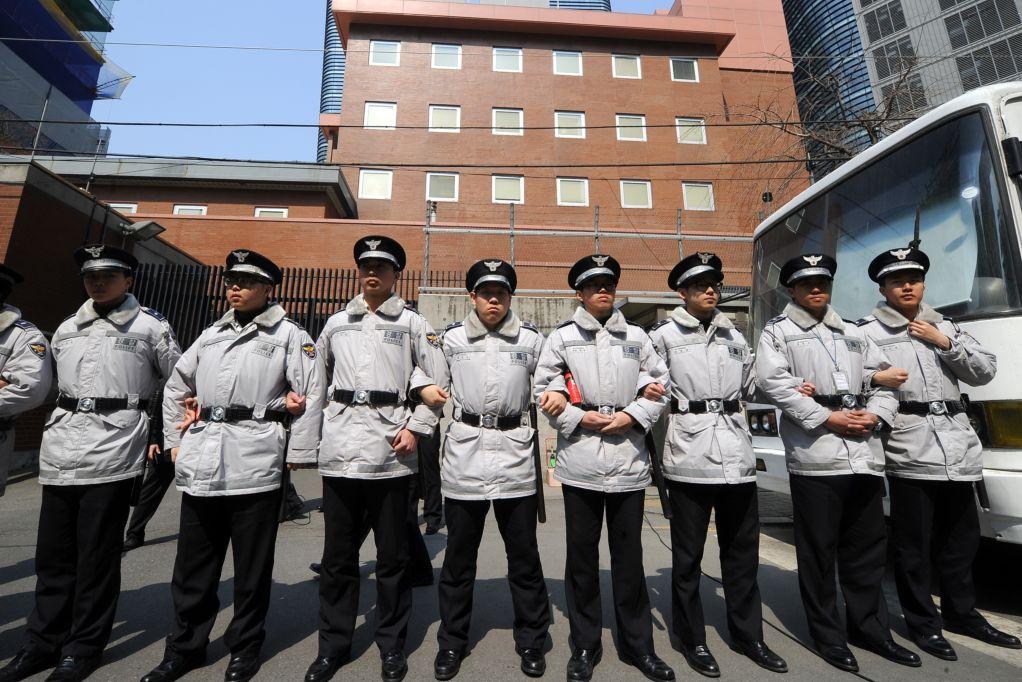Tsunami diplomacy: South Korea and Japan
Policemen stand guard in front of the Japanese embassy as South Korean protesters hold a rally against new Japanese textbooks in Seoul on March 30, 2011.
SEOUL, South Korea — Despite their historic rivalry, South Koreans rallied to help the Japanese in the wake of the devastating tsunami and earthquake on March 11.
Pledging more than $31.8 million, according to the Joongang Daily newspaper, South Koreans gave out of genuine compassion. But to some that compassion now feels foolish.
Not three weeks later, Japan did what many South Koreans consider to be a betrayal — Japan renewed and strengthened its claim to Dokdo, a small cluster of islets and rocks that sits between the Korean peninsula and the Japanese archipelago, that has been in dispute since colonial days.
This past week, Japan increased the number of textbooks that claim South Korea is "illegally occupying" Dokdo. The issue arises each year when Japanese school textbooks come up for government approval.
On the heels of the textbooks came the April release of Japan’s Diplomatic Blue Paper, a set of documents released by Japan’s cabinet that details foreign policy stances for the coming year. This year’s report makes official claims to Dokdo.
Dokdo has a long and colorful history. Before the Russo-Japanese War of 1905, both Korea and Japan recognized Dokdo (or Takeshima as it is called in Japanese) as Korean territory. Japan first occupied Dokdo due to its strategic location. As Japan ended its formal occupation of Korea in 1945, Dokdo wasn’t listed among the territories that were handed back.
South Koreans argue that Japan's claim to Dokdo is illegitimate, and it is a sore point that has led to several flareups in tensions between the two countries over the years. In 2005, Japan declared Feb. 22, the 100th anniversary of Japan’s annexation, "Takeshima Day." The claim set off an emotional outcry in South Korea that resurfaces each year.
South Koreans still have unrequited grievances against the Japanese from colonial times and remain concerned about their territorial integrity.
Japan’s colonization is perhaps remembered most vividly by those who lived through it. On Wednesday, the day the updated textbooks were announced, a few dozen South Koreans, most past retirement age, held a rally in Seoul calling on the Japanese government to formally withdraw their territorial claim to Dokdo.
Lee Jeong-woo, an elderly gentleman who came to protest at Japan’s embassy in Seoul, said he feels the sting of betrayal. “As for the earthquake, we gave a lot of money so they could eat and survive. Other countries didn't pay; we did because they’re our brethren. And after that they say that Dokdo is theirs,” he said.
“It’s like they have no conscience,” said Han Hye-sook, who runs a small restaurant near the Japanese embassy in Seoul. “They’ve made us look stupid for giving them money after the earthquake.”
She continued, “I totally oppose [the Japanese claim to Dokdo]. The Japanese have no business there; I don’t understand how they can say this.”
Twelve out of 18 texts, written according to guidelines set by the Japanese government, refer to Dokdo/Takeshima as Japanese territory and the South Korean presence there as an illegal occupation. The textbooks’ wording was made bolder this year and a greater number of texts carry messages condemning the South Korean presence on Dokdo than did last year.
“Takeshima is Japan’s territory,” reads a new textbook produced by Tokyo Shoseki, according to Seoul’s Ministry of Foreign Affairs and Trade. The book’s entry goes on to read, “Korea is illegally occupying the island, so we are continuously protesting to the Korean government about it.”
An editorial in South Korea’s Chosun Daily newspaper argued that Japan is altering school textbooks, “to infuse them with an increasingly nationalistic tone, whitewashing its wartime atrocities and intensifying claims to Dokdo.”
In South Korea, the world’s most wired country, online message boards bubbled with disapproval of Japan’s line, but also pleas to continue to support Japan as its recovery continues. Some commentators on Twitter and the South Korean site Naver asked fellow netizens to keep up the donations in spite of the Dokdo issue.
South Korea has declined Japan’s urges to discuss the Dokdo dispute at the International Court of Justice, and Seoul has announced plans to enhance governance of the islets through measures including a helipad and research ventures in the area. Foreign Minister of Japan Takeaki Matsumoto cited these South Korean plans as damaging to the bilateral relationship.
Many in South Korea are concerned about a revival of anti-Japanese sentiment following an unusual warming in bilateral relations after the tsunami.
Japan currently has more pressing issues to deal with than a diplomatic flap. The Dokdo issue is unresolved, but radiation and reconstruction demand more attention than a barely inhabited group of islets.
Neither side appears ready to yield. According to South Korea’s foreign ministry spokesman Cho Byung-je, Dokdo, “is manifestly our territory historically and geographically and according to international law.”
Every day, reporters and producers at The World are hard at work bringing you human-centered news from across the globe. But we can’t do it without you. We need your support to ensure we can continue this work for another year.
Make a gift today, and you’ll help us unlock a matching gift of $67,000!
